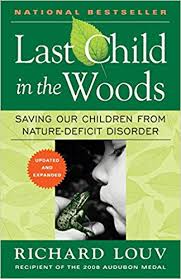Richard Louv, The Last Child in the Woods
Listen to the Recess! Clip
| Author | John Cech |
| Air Date | 3/9/2006 |

Richard Louv, The Last Child in the Woods Transcript
Remember when our parents used to tell us to run outside to play, and if we asked why (especially if our favorite television program was on), they told us that fresh air was good for us. And, of course, they were right. So what went so wrong with our world that children are so seldom outdoors — during school hours for recess, or after school, or on weekend camping trips? Those idyllic, nature-induced, childhood memories that many adults cherish have vanished, in just a few decades, for many children in our own and other lands.
As Richard Louv explains in his penetrating new book, The Last Child in the Woods: Saving Our Children from Nature Deficit Disorder, the problem is a complex interweaving of such factors as electronic technology, poor city and suburban planning, as well as a host of related issues that keep us and our children indoors rather than in nature. The whole adds up to a contemporary condition that Louv relates to “the human costs of alienation from nature, among them diminished use of the senses, attention difficulties, and higher rates of physical and emotional illnesses. The disorder can be detected in individuals, families, and communities….” He reminds us that “long-standing studies show a relationship between the absence, or inaccessibility, of parks and open space with high crime rates, depression, and other urban maladies” (34).
But if you thought from the title and his opening chapters that you were in for a jeremiad about the evils of technology, planned developments, or green space neglect, you’d be mistaken. Louv is interested in adding his eloquent voice and his help to turn the balance in favor of a fuller, richer, more innovative contact between our children (and ourselves) and the natural world, whether we live in cities, suburbs, or the country. He sees possibilities in our homes, our communities, our schools for what he describes as “reducing the deficit,” and he assembles compelling recent research on such problems as ADD and ADHD, along with abundant first-hand evidence to make his important case.
For, Louv writes, “Reducing that deficit — healing the broken bond between our young and nature — is in our self-interest, not only because aesthetics or justice demands it, but also because our mental, physical, and spiritual health depends upon it. The health of the earth is at stake as well. How the young respond to nature, and how they raise their own children, will shape the configurations and conditions of our cities, homes — our daily lives”(5).